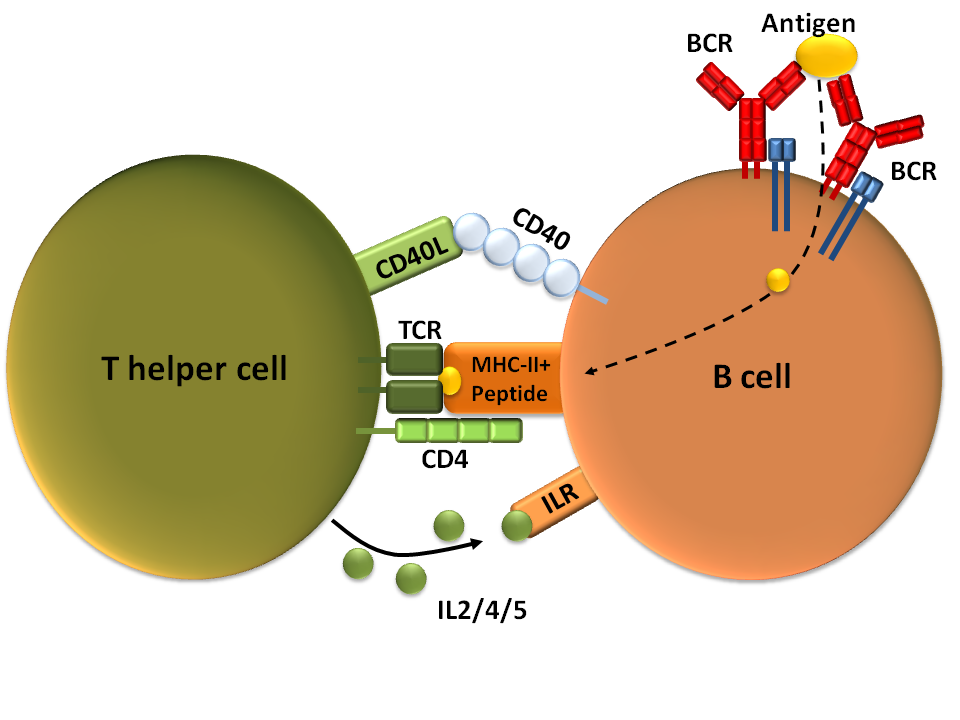Sunday, 7 December 2014
T cell dependant Antigens
Sunday, 7 December 2014 by Unknown
B cells obtain help from T cells in the antibody response by acting as antigen-specific antigen presenting cells. A direct signal through binding of antigen to membrane Ig can enhance B cell antigen presentation and T-dependent B cell activation, but is not required for a productive interaction between a small resting B cell and a differentiated helper T cell.  As a result of helper T cell recognition of antigen on the B cell surface, the T cell becomes activated and in turn activates the B cell. T cell help has two components: lymphokines which act as growth and differentiation factors for B cells, and additional signals which require cell contact and enable B cells to respond to lymphokines. Contact help activity is regulated like lymphokine synthesis and secretion. Because contact help activity is retained by fixed, activated helper T cells and plasma membranes prepared from activated T cells, contact help is likely to be owing to new proteins expressed as membrane-bound lymphokines or activation antigens on helper T cells. Once induced, contact help can be delivered to B cells independently of recognition of antigen/class II MHC. A newly identified activation antigen of helper T cells, a ligand for the B cell differentiation antigen, CD40, is a key component of contact help. The roles of other T and B cell membrane molecules in contact help are reviewed.
As a result of helper T cell recognition of antigen on the B cell surface, the T cell becomes activated and in turn activates the B cell. T cell help has two components: lymphokines which act as growth and differentiation factors for B cells, and additional signals which require cell contact and enable B cells to respond to lymphokines. Contact help activity is regulated like lymphokine synthesis and secretion. Because contact help activity is retained by fixed, activated helper T cells and plasma membranes prepared from activated T cells, contact help is likely to be owing to new proteins expressed as membrane-bound lymphokines or activation antigens on helper T cells. Once induced, contact help can be delivered to B cells independently of recognition of antigen/class II MHC. A newly identified activation antigen of helper T cells, a ligand for the B cell differentiation antigen, CD40, is a key component of contact help. The roles of other T and B cell membrane molecules in contact help are reviewed.
 As a result of helper T cell recognition of antigen on the B cell surface, the T cell becomes activated and in turn activates the B cell. T cell help has two components: lymphokines which act as growth and differentiation factors for B cells, and additional signals which require cell contact and enable B cells to respond to lymphokines. Contact help activity is regulated like lymphokine synthesis and secretion. Because contact help activity is retained by fixed, activated helper T cells and plasma membranes prepared from activated T cells, contact help is likely to be owing to new proteins expressed as membrane-bound lymphokines or activation antigens on helper T cells. Once induced, contact help can be delivered to B cells independently of recognition of antigen/class II MHC. A newly identified activation antigen of helper T cells, a ligand for the B cell differentiation antigen, CD40, is a key component of contact help. The roles of other T and B cell membrane molecules in contact help are reviewed.
As a result of helper T cell recognition of antigen on the B cell surface, the T cell becomes activated and in turn activates the B cell. T cell help has two components: lymphokines which act as growth and differentiation factors for B cells, and additional signals which require cell contact and enable B cells to respond to lymphokines. Contact help activity is regulated like lymphokine synthesis and secretion. Because contact help activity is retained by fixed, activated helper T cells and plasma membranes prepared from activated T cells, contact help is likely to be owing to new proteins expressed as membrane-bound lymphokines or activation antigens on helper T cells. Once induced, contact help can be delivered to B cells independently of recognition of antigen/class II MHC. A newly identified activation antigen of helper T cells, a ligand for the B cell differentiation antigen, CD40, is a key component of contact help. The roles of other T and B cell membrane molecules in contact help are reviewed.
Subscribe to:
Post Comments (Atom)


0 Responses to “T cell dependant Antigens”
Post a Comment